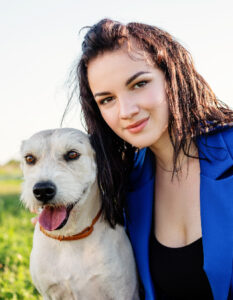Wow! I have one, and I’d love to write about it!
Golden Retriever puppies are the most popular dog breed in the world, consistently ranking in the top 5 most popular dog breeds in the United States, and for a good reason!
These adorable pups are friendly, intelligent, and easy to train, which makes them a great addition to any household.
If you’re thinking about getting a new furry friend for your family, there’s no doubt that a Golden Retriever puppy is a paw-some choice. However, there are a few things you should know to ensure your new Golden Retriever puppy stays happy and healthy before you make the commitment and bring them home.

That’s why we’ve compiled a comprehensive guide covering everything you need to learn about Golden Retriever puppies, from their temperament and health concerns to their training needs and exercise requirements.
So, whether you’re a seasoned pet parent or a first-time dog owner, this guide will give you all the info you need to keep your new furry friend wagging their tail for years. Let’s dive in and learn all about Golden Retriever puppies!
About The Breed
The Golden Retriever, a lively and captivating gundog hailing from Scotland, ranks as one of the most beloved dog breeds in the United States. They’re not just companions but exceptional at hunting, acting as guide dogs, and participating in search-and-rescue missions.
They’re medium-sized, muscular dogs renowned for their shiny, golden coats. Their broad, intelligent faces and smooth, powerful strides are unmistakable traits.
Historical records from the Guisachan estate in Scotland provide detailed accounts of the breed’s origin, revealing stories passed down through generations.
These puppies are sociable, dependable, and typically easy to train. Their playful nature persists from puppyhood into adulthood. Being bred for retrieving game from water, they naturally love swimming and fetching, making them ideal for active outdoor families.
History
The story of the Golden Retriever starts with Dudley Marjoribanks, the first Lord Tweedmouth. He began developing the breed in the Scottish Highlands during Queen Victoria’s time. From 1840 to 1890, he carefully bred dogs to create the ideal hunting partner for his estate in the Scottish Highlands.

He mixed his “Yellow Retriever” with a now-extinct breed, the Tweed Water Spaniel, and added an Irish Setter and Bloodhound. This thoughtful breeding led to an excellent line of working retrievers.
After some additional refinements, the Golden Retriever as we know it was born, a gift from a hunting enthusiast to dog lovers everywhere. Golden Retrievers first appeared at a British dog show in 1908. Around the same time, they started to arrive in America via Canada.
Hunters liked their practicality, show enthusiasts loved their beauty, and everyone appreciated their gentle nature. While the Golden Retriever was always liked in America, the breed became popular in the 1970s, thanks partly to President Gerald Ford and his beautiful Golden Retriever, Liberty.
Breed Traits & Characteristics
These breeds are known for their adorable looks and lovable personalities. Let’s take a glance at some of their physical traits and personality characteristics –
1. Personality and Temperament
- Affectionate with Family: While some breeds hold an air of independence, reserving their affections primarily for their owners, Golden Retrievers stand apart. These adorable canines have a heart as golden as their coat, treating everyone they are familiar with as their cherished friends. Their affection knows no bounds, truly making them the epitome of a man’s best friend.
- Compatibility with Young Children: These puppies show high levels of patience and gentleness with children; it’s vital to remember that supervision is always recommended when dogs interact with young children or any children who are not accustomed to being around dogs.
- Compatibility with Other Dogs: It’s important to note that supervision should always be in place during interactions and introductions with other dogs. However, some breeds are naturally more sociable and inclined to get along with other dogs at home or in public spaces.
2. Appearance and Physical Traits
These puppies are medium- to large-sized with a sturdy build and muscular bodies. They have a dense double coat that comes in shades of gold or cream, and their fur is water-resistant, which makes them excellent swimmers. These golden pups have a cute, cuddly appearance, soft fur, and floppy ears. As they grow older, they develop a handsome, noble-looking face with friendly expressions.
Types
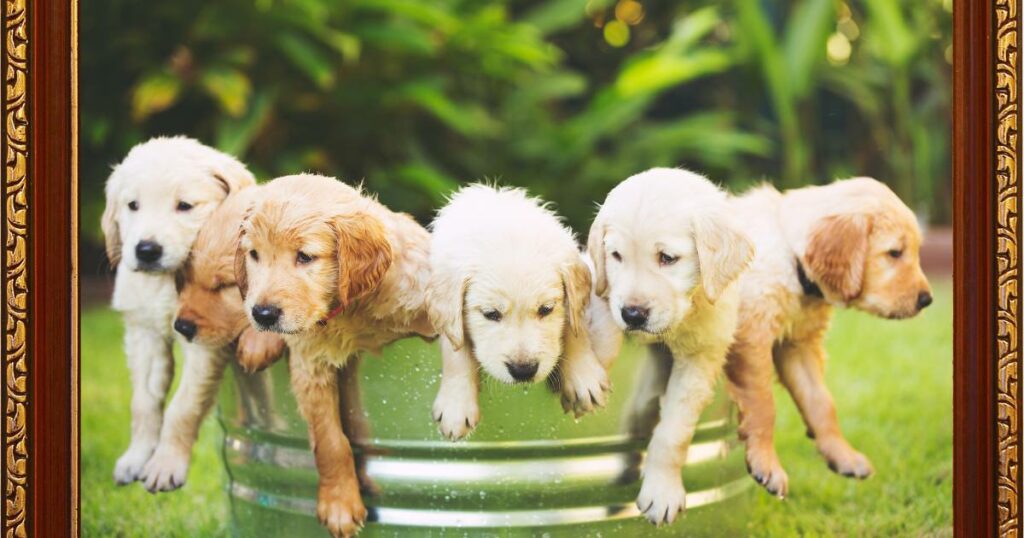
There are two varieties of this adorable breed: American and English. American Golden Retrievers are lankier and more athletic, while English Golden Retrievers are shorter and stockier.
Available Colors
There are various shades of gold or cream in this breed. Some may have darker or lighter coats, but all are equally beautiful.
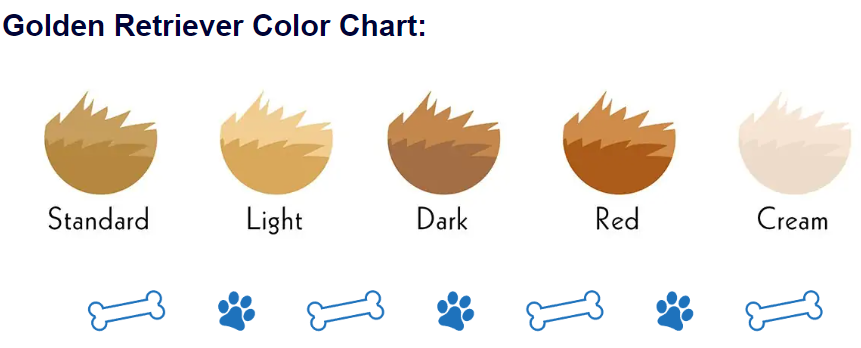
Size
These puppies grow quickly and reach adults in 12-18 months. They typically weigh 55-75 pounds and stand 21-24 inches tall at the shoulder

Caring for Golden Retriever Puppies
The responsibility of caring for a Golden Retriever may be very fulfilling, but it also takes a lot of time, work, and commitment. From providing proper nutrition to ensuring they get enough exercise, there are various factors to consider when caring for this puppy. So, here are some tips to assist you in looking after your new furry friend!
1. Health
Golden Retrievers are typically a robust breed. Nonetheless, vigilant breeders will routinely screen their Golden Retrievers for potential health concerns. These can include joint issues such as elbow and hip dysplasia; ocular disorders like juvenile cataracts, pigmentary uveitis, and progressive retinal atrophy; and certain cardiac conditions like subvalvular aortic stenosis.

As part of your weekly grooming routine, inspecting your furry friend’s ears for any signs of infection is wise. Routine brushing of their teeth is also recommended, not just for fresh breath but for their overall health too.
For their optimal health, the National Breed Club recommends a series of tests –
- A comprehensive hip evaluation to screen for dysplasia.
- A DNA test specifically for Neuronal Ceroid Lipofuscinosis 5 (NCL, NCL5), a condition that can affect Goldens.
- An elbow evaluation to ensure good joint health.
- A thorough cardiac exam is to rule out any heart diseases.
- An ophthalmologist’s evaluation to confirm the health of their eyes.
2. Exercise and Training
Giving golden puppies enough opportunity to exercise is crucial because they are playful and lively. They typically need to exercise for at least 30 minutes each day, while some may need to exercise for longer, depending on how energetic they are.
These pups are smart and eager, making them relatively effortless to train. However, a great way to train your dog is by playing fetch with them and teaching them to respond to your cues.
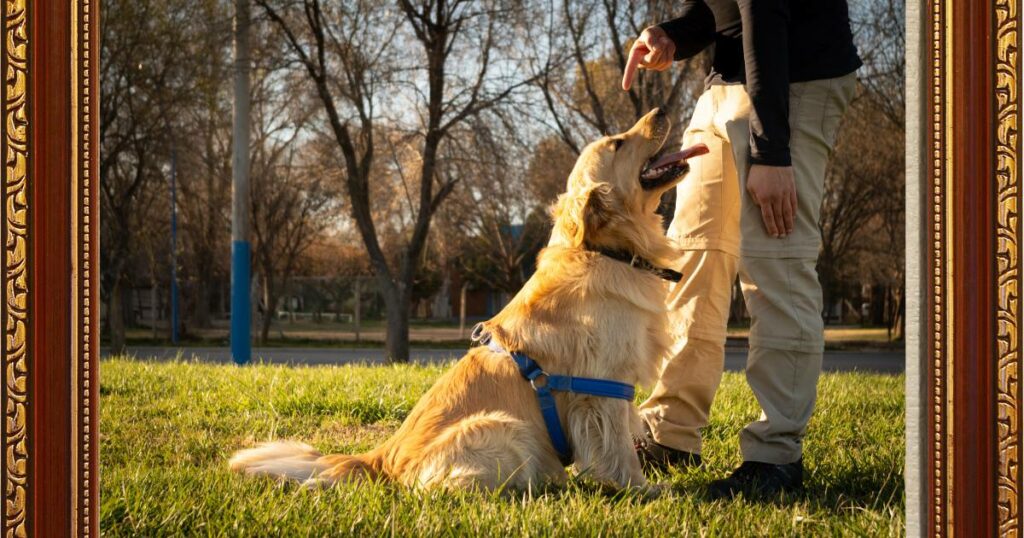
Start training as early as possible, around 8–10 weeks of age, and being consistent with the routine is crucial.
Common behavior issues such as jumping, chewing, and digging can be redirected by rewarding positive behavior with a toy or treat. Teaching your pup to fetch can be fun and rewarding for the puppy and the owner.
Housebreaking is an important aspect of training. Taking your puppy outside frequently to go potty and rewarding them for good behavior reinforces the right habits. Remember to be patient and constant with your training, and don’t hesitate to seek professional help.
3. Grooming
Grooming your golden pup is essential to maintaining its health and appearance. These pups have a thick coat that sheds seasonally, so regular brushing is necessary to prevent matting and tangles. Try to brush their coat at least twice a week with a smoother brush or a comb designed for long-haired dogs.
Additionally, bathing your dog every two to three months will help keep its coat clean and shiny. Using dog-specific shampoo is essential to avoid drying out their skin. And rinse thoroughly to avoid any leftover soap residue, which can cause skin irritation.
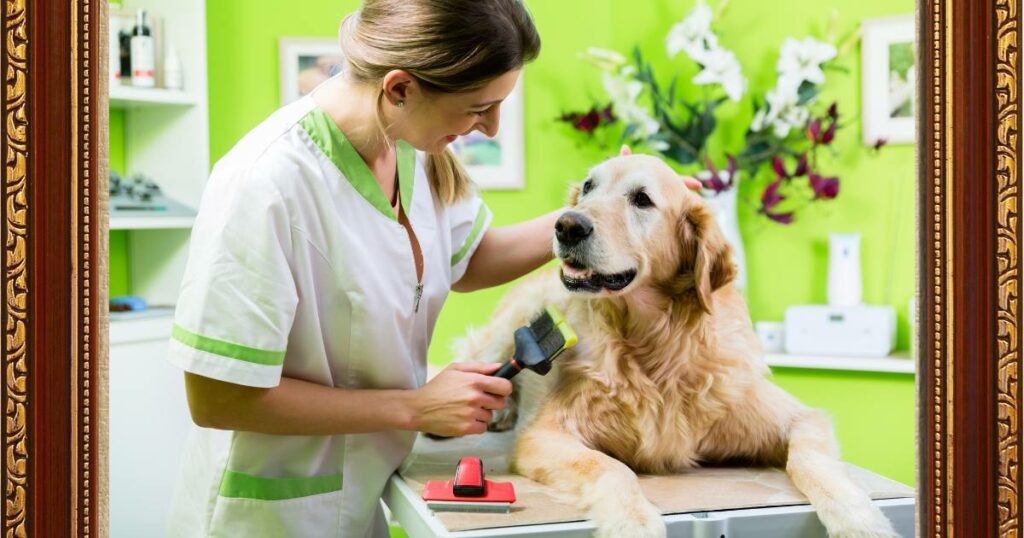
When it comes to health, these breeds are generally healthy dogs. There are, however, certain widespread medical issues, including allergies, cataracts, and hip dysplasia. So, routine check-ups with a veterinarian can help detect these issues early on and prevent them from becoming serious.
According to the National Breed Club, it is recommended that your golden pup should undergo a hip and elbow evaluation, a cardiac exam, and an ophthalmologist evaluation for optimal health.
As for vaccinations, your puppy will require a series of shots to protect against diseases like rabies, distemper, and parvovirus. Following your veterinarian’s recommended vaccination schedule is important to ensure your puppy stays healthy and protected.
Overall, grooming and health are crucial to caring for your pup. And following a regular grooming routine and keeping up with check-ups and vaccinations can ensure your furry friend stays happy and healthy for years.
4. Feeding
In 2020, a survey conducted by the Association for Pet Obesity Prevention (APOP) revealed that over half of the dogs in the United States, or around 56%, were classified as overweight or obese. Feeding a high-quality diet and monitoring portion sizes can help prevent obesity and promote a healthy weight in puppies.
Therefore, when it comes to feeding your golden pup, you want to ensure that your furry friend gets the best nutrition, right? High-quality dog food specially formulated for puppies is typically the way to go. This kind of food is made to provide your pet with all the vitamins, minerals, and nutrition they need to thrive.
However, when selecting commercial dog food, choose one made from high-quality ingredients, including whole meats, vegetables, and grains. Avoid foods that contain fillers, by-products, and artificial preservatives or colors, as these can harm your puppy’s health.
Additionally, paying attention to the kibble’s size and texture is important. Golden pups have small mouths and may have difficulty chewing larger kibbles. So, look for a food with smaller-sized kibble, or consider soaking it in warm water to make it easier for your puppy to eat.
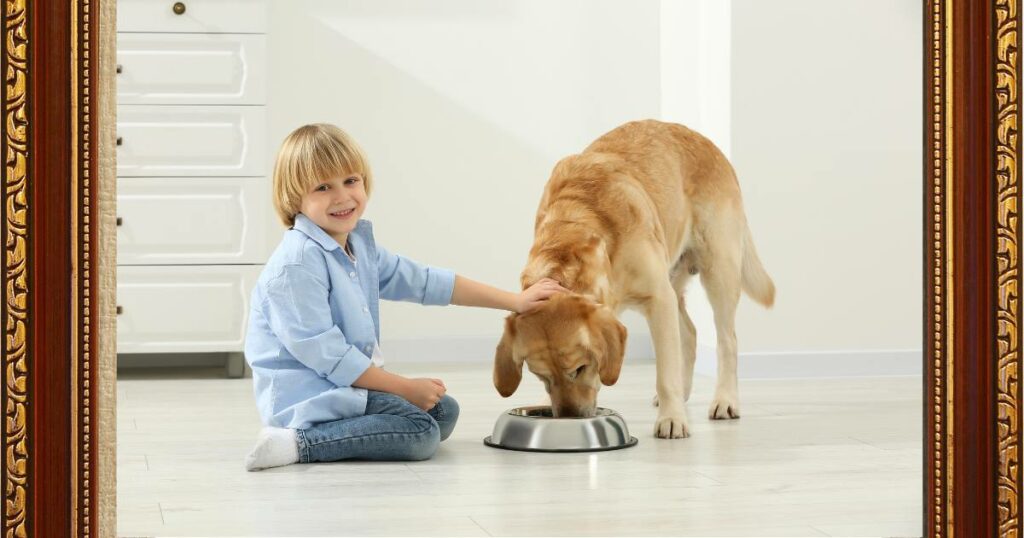
If you wish to add some fresh foods to your puppy’s diet in addition to commercial dog food, choose prepared lean meats like chicken or turkey and fresh fruits and vegetables, which may be a nutritious supplement to your puppy’s diet. However, avoid foods toxic to dogs, like chocolate, grapes, and onions.
And last but not least, as with any feeding routine, it’s important to establish a consistent schedule for your puppy. Most puppies should be fed three to four times daily until they are six months old, and gradually transition to two meals daily. Be sure to monitor your puppy’s weight and adjust their portion sizes as needed to ensure they maintain a healthy weight.
Buying or Adopting a Golden Retriever Puppy
Adopting a dog may be an exciting and rewarding experience. However, before taking a puppy home, there are a few things you should think about.
First, decide if it’s the right breed for you and your lifestyle. They require plenty of exercise and attention, so make sure you can commit to meeting their needs.
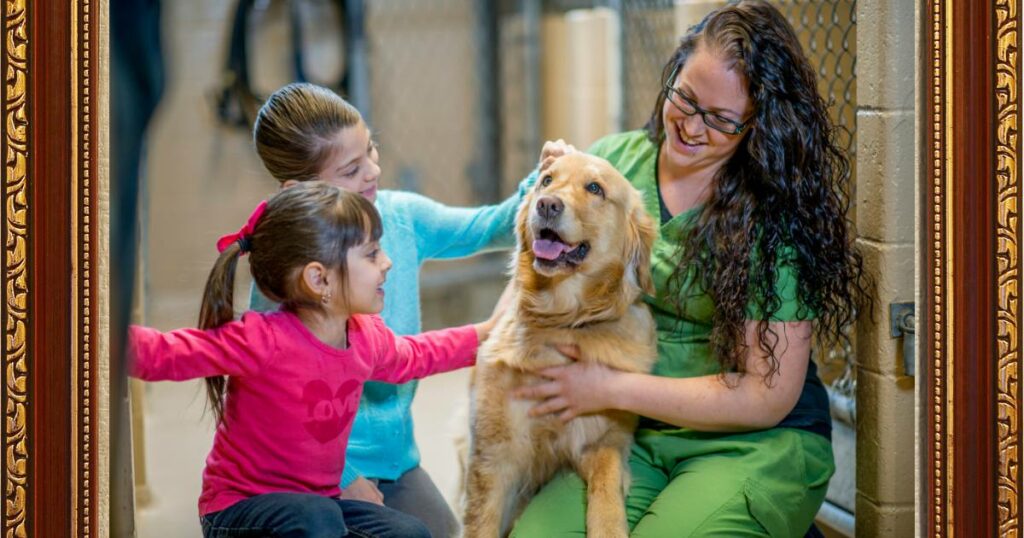
When looking for a breeder or shelter, it’s essential to do research and find a reputable source. A reputable breeder will provide their puppies with excellent care, a clean and safe environment, and knowledgeable information about the breed. Ask for references and check their credentials, such as certifications from the AKC or other recognized organizations.
When you visit a breeder or shelter, pay attention to the puppies’ living conditions and behavior. The puppies must have a nutritious diet, be kept tidy, and have access to plenty of fresh water. They should also be friendly and social, showing no aggression or fear.
It’s also important to ask about the puppy’s health history and any vaccinations or medical treatments they may have received. A good breeder or shelter will provide you with this information and may also offer a health guarantee for the puppy.
If you’re considering adopting a golden pup, several organizations can help you find a reputable breeder or adopt from a rescue organization.
The Golden Retriever Club of America and AKC both have breeder referral programs, and there are many rescue organizations, such as Golden Retriever Rescue of the Rockies and Golden Retriever Rescue and Adoption of Needy Dogs.
Wrapping Up
Bringing a Golden Retriever puppy into your home is thrilling and satisfying. However, it’s crucial to comprehend the obligations and expectations that go along with pet ownership.
You can ensure your furry companion’s happy and healthy life by providing proper training, socialization, and healthcare. Remember to research and seek professional guidance to give your puppy the best possible start in life.
With patience, love, and dedication, your new furry friend will bring joy and companionship for many years.
FAQ
Where to Get Golden Retriever Puppy?
The easy way to find a golden pup is to go to your local golden retriever club’s website! Or you can also consider adopting this breed from a local animal shelter or rescue organization.
How Much Does Golden Retriever Puppy Cost?
This puppy’s cost depends on the breed’s location, reputation, experience, lineage, and any additional services provided. However, the typical price range for a golden retriever puppy from a good breeder is between $1500 and $4000.
How to Stop a Golden Retriever Puppy from Biting?
Golden pups are known for their lively and energetic nature, often including nipping or biting. However, training your puppy to stop biting as soon as possible is essential to avoid harming yourself or others. Here are some tips to help stop your puppy from biting:
- Use positive reinforcement
- Offer a toy
- Avoid physical punishment
- Socialize your puppy
- If your puppy’s biting behavior persists or becomes aggressive, seek the help of professional help.
What to Feed a Golden Retriever Puppy?
To meet your puppy’s nutritional requirements for protein, carbs, and healthy fats, choose food of the highest caliber. It’s also important to follow the recommended feeding guidelines provided by the manufacturer and to avoid overfeeding, as these breeds are prone to obesity.
How Much to Feed a Golden Retriever Puppy?
Small meals multiple times a day are recommended for this pup until they are 6 months old, and then you can switch to two meals a day. The amount of food should depend on their weight, activity level, and age.
A typical serving size is about one cup of food per day per 20 pounds of body weight. However, to determine the right quantity and kind of food for your dog’s needs, it would be best to speak with your veterinarian.
How Often Do Golden Retriever Puppies Pee?
These puppies can frequently pee, up to 8-12 times a day, especially during the first few months of their lives. Generally, they need to pee every 1 to 4 hours, depending on their age. They may require to go out every hour or less for eight weeks. By six months of age, they can typically hold their bladders for 4 hours or more.
When can Golden Retriever Puppies Leave Their Mother?
These puppies ideally stay with their mother and little mates until they are 8 weeks old. After that, this is the perfect time you can take him or her home to live with you. Separating them too early can lead to behavioral problems later in life.

